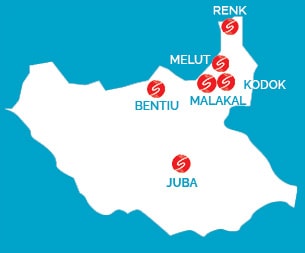
Context
The political instability that has persisted in the country since its independence in 2011 and the outbreak of civil war in 2013 has plunged the country into a protracted crisis. Despite the signing of the peace agreement and the establishment of a unified government in February 2020, armed conflicts between opposition and government forces, as well as intercommunal clashes, persist in several areas of the country. The economic situation of South Sudan has significantly deteriorated, marked by constant fluctuations in the currency exchange rate that affect the population’s purchasing power and access to essential resources. The country continues to experience widespread food insecurity at Crisis (IPC Phase 3) and Emergency (IPC Phase 4) levels.
The displacement of 2.2 million people within the country has exacerbated the already considerable humanitarian needs, particularly in WASH, Food Security, Livelihoods, and Shelter. As of 2023, out of the 12.4 million people living in the country, 9.4 million (76% of the population) are estimated to be needing humanitarian assistance or protection services.
Moreover, recurrent, and heavy rainfall, aggravated by climate change, have lead to floods occurring in numerous states over the past years. This has led to certain parts of the country being permanently flooded. Therefore, communities in several states have to rely on stagnant and unsafe water from swamps. Open Defecation is also a common practice, mostly due to the lack of latrines. These factors increase the exposure of the population to waterborne diseases and other illnesses.
The overall situation has been further exacerbated by the ongoing conflict in Sudan, which erupted on April 15, 2023, forcing over 200,000 people, mostly returnees, to seek refuge in South Sudan. The influx of people fleeing has brought to the forefront the inadequacy of the country’s infrastructure and entrenched socio-economic challenges which prevent it from being able to absorb the shock.
- 12.44 million inhabitants
- 191th out of 191 countries on the Human Development Index
Our action

-
Mission
opened in 2006 -
Team
11 international staff
36 national staff - Budget 6.63M€
SOLIDARITÉS INTERNATIONAL provides an immediate, integrated, multi-sector and front-line response to the acute needs of the most vulnerable populations affected by severe crises. This is done while restoring access to basic services to increase resilience through medium-term projects.
In partnership with other humanitarian actors, SOLIDARITÉS INTERNATIONAL implements emergency response activities in different areas of the country. Key WASH activities include water trucking, Surface Water Treatment (SWAT) operation, borehole rehabilitation, latrine construction, mobile sanitation, distribution of kits. To fight the severe food security crisis the country is facing, Food Security & Livelihoods activities are implemented to reinforce food production (fishing kits, vegetable gardening) and ensure access to markets. Under the response to the Sudan crisis, shelter activities are implemented for people on the move. These activities are delivered through both cash and in-kind modalities.
Under its double nexus strategy, SOLIDARITÉS INTERNATIONAL implements a multisectoral project with WASH and FSL activities for IDPs and host communities looking at reducing tension around access to natural resources. This entails to implement WASH and FSL activities with a conflict sensitivity lens and to include communities and Local NGOs in the development of plans to ensure this outcome.
Institutional and private funding partners CDCS, EU, ECHO, SSHF
Operating partners Nonviolent Peaceforce, NRC, DRC and MEDAIR
Our impact

Water, sanitation and hygiene
- Construction and rehabilitation of water facilities
- Chlorination of water at the household level and surface water treatment
- Training of water management committees and mechanics
- Construction of emergency latrines
- Construction of community latrines
- Distribution of emergency hygiene kits
- Construction and repair of water, hygiene and sanitation infrastructure in health centers and schools
- Human and Solid waste management in transit centers, health centers and markets
- Promotion of good hygiene practices, notably raising awareness in the fight against waterborne diseases

Food security and livelihood
- Increased food production: Distribution of seeds, agricultural tools, fishing kits
- Technical support to farmers and fishing communities through training and awareness creation
- Improved access to market through provision of means of transport (canoes, bicycles)
- Monitoring crop and vegetable yield harvests and fish catches

Shelter
- Provision of shelter kits to people on the move
Should you have any questions, please contact Raphaëlle Goepfert.

Vacancies
At head office
Worldwide
Internships
